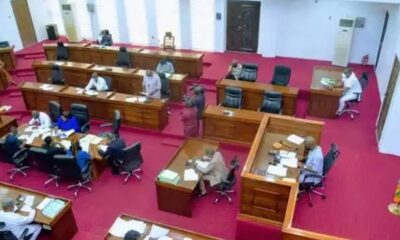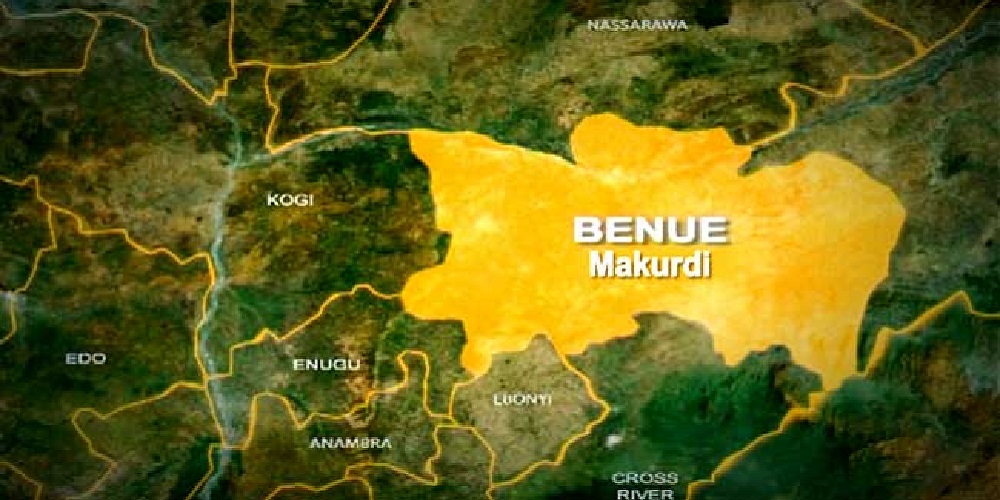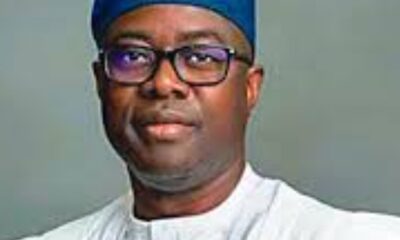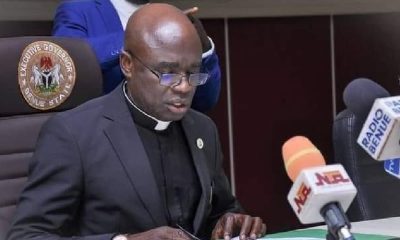News
Hardship: Benue ex Commissioner, Olofu launches N50m education fund for Idoma students (Photos)
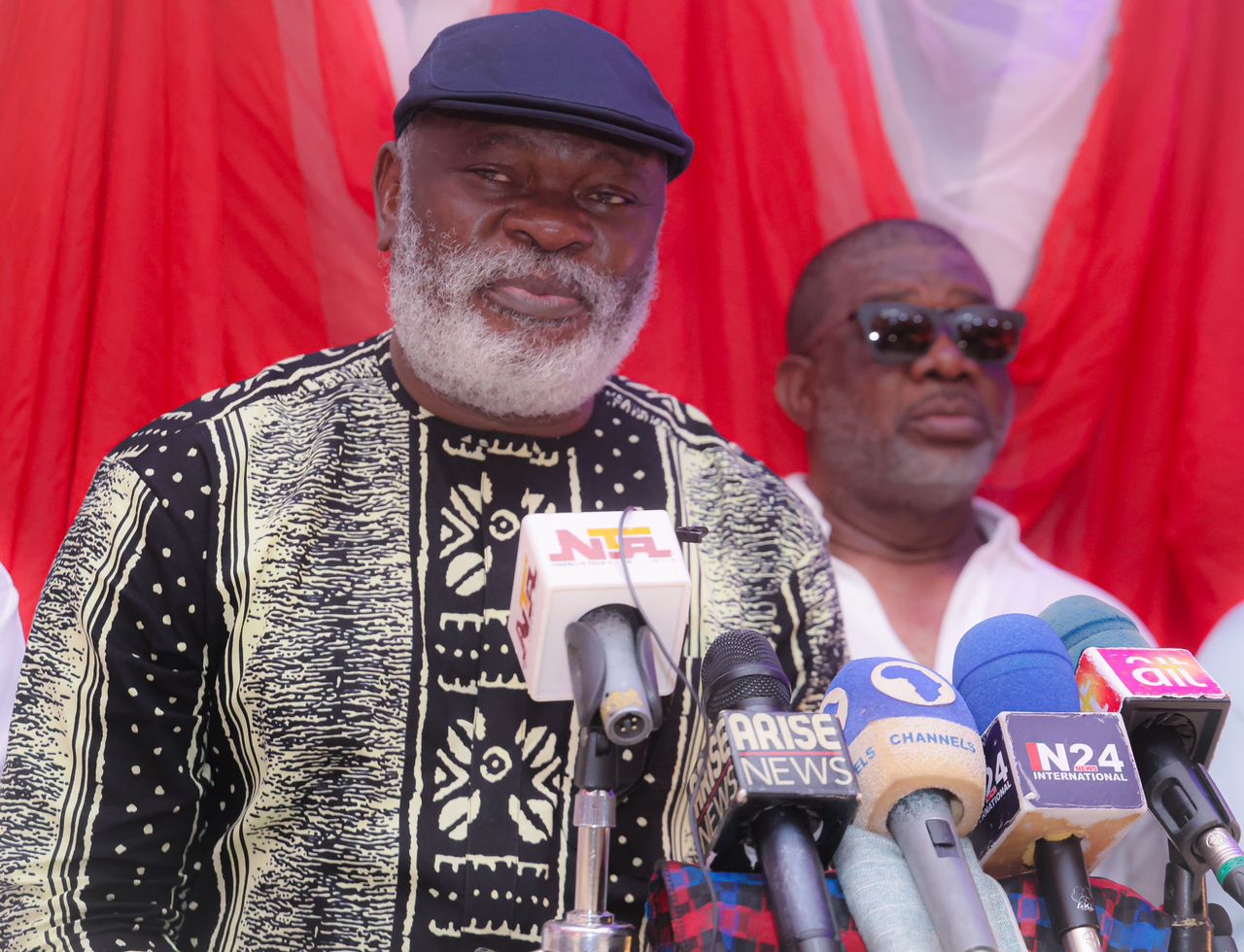
Former Commissioner for Finance in Benue State, Dr. David Olofu, has launched a N50m Education Support Fund, to carter for the hardship being faced by Idoma students in tertiary institutions across the 9 Local Government Areas of Benue South.
Olofu, who was the Chairman of the Forum of Commissioners for Finance in Nigeria, and current Senior Technical Advisor to the Nigerian Governors’ Forum, said the initiative was to support the President Bola Ahmed Tinubu led administration’s resolve to provide succours to the students.
Olofu was initially nominated by the Idoma Area Traditional Council for a chieftaincy title in Otukpo, but barely 48 hours to the event, he was allegedly delisted, on the order of the Governor Hycient Alia. No official statement from the Governor’s media team yet.
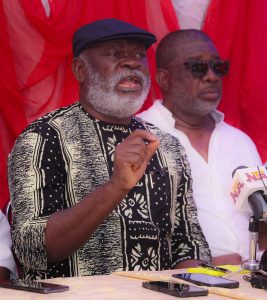
But Olofu, at a press conference in Otukpo, Benue State on Friday, said he had put that behind him, saying, he would rather use the funds raised for the reception of the event, to put smiles on the faces of Idoma students.
“As you are aware, in the last couple of days, I was scheduled to be conferred with the chieftaincy title by the revered Idoma Area Traditional Council.
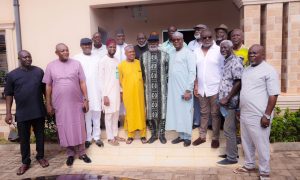
“And when I got the notification from his Royal Majesty, the Och’Idoma, I informed all my friends and associates, my political party and also constituted the central planning committee to make sure that we have a successful confirmation ceremony.
“Less than 48 hours to the event, I got notification that, that will no longer be the case. In the meantime, my friends, colleagues and associates had supported me to make sure that this event was held hedge free.
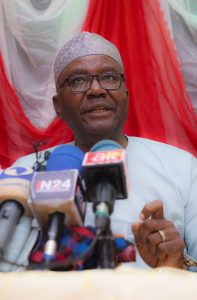
“I have to some extent, utilized the support that was provided, but I did not exhaust what was provided and I felt that, given that, that provision had been made by them, I reached out to them and we came to a conclusion that I should apply the balance of what has been contributed to support my people in any way possible, and in consultation with my constituency and my leaders across party lines.
“Let me also mention that, this contribution that I have mentioned came in from all over the federation, across party lines. Both people who are in PDP, APC, APGA and Labour, contributed to this event to identify with the honor that was going to be bestowed on me by His Royal Majesty, the Och’idoma.
“You may recall, I served as the chairman of the Forum of Commissioners of Finance of Nigeria, and currently serving as Senior Technical Advisor to Nigerian Governors’ Forum.
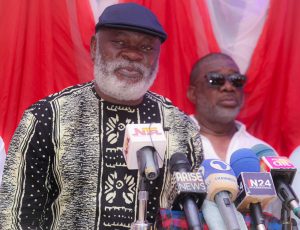
“So, the support came across board and from all over the federation. And after consultation with my leaders, we decided that we apply what is left from the support that I have received to support Idoma students in higher institutions, by way of what I refer to as Education Support Fund.
“So today, by the grace of God, we are using what has been contributed by my colleagues, friends and associates, to set up an Education Support Fund, under the umbrella of Apa Legacy Sustainability Initiative.
“And we have a window of about 50 million, with an initial inflow of about 20 million and a projection of 10 million per year, to reach out to all the students that will qualify for this intervention”, Olofu said.
He recounted how he resorted to serving as a waiter in restaurants during his days at the University of Agriculture, Makurdi, just to meet up with his education funding; adding that, he fought the temptations to quit schooling and saw himself to the graduation.
In naming the Board of Trustees of the Education Support Fund, Olofu said, “We consulted widely and we came to a conclusion that our brother, our leader and our son, who is currently serving as a senior lecturer at the Federal University Wukari; our own brother, Professor David Salifu, a former SSG to serve as the chairman of the Board of Trustees that will administer this fund.
“Let me emphasize that, this fund will devoid of political affiliations and to work with him in that team, we have also recognized that we bring on board the National Association of Idoma Students (NAIS).
“We also recognized the need to have a representative of the Idoma Area Traditional Council and also a representative of civil society on that team and to provide secretarial services, we have also nominated Honourable Owoicho Oyi, the former chairman of Apa Local Government, to serve in that capacity”.
The Board chairman, Prof. Salifu in his acceptance message, described the project as laudable and enjoined other Idoma sons and daughters to emulate the initiator of the project, Dr. Olofu.
“I accept my appointment to chair the Board of the Education Support Fund initiated by my younger brother, the immediate past Benue Finance Commissioner, Dr. David Olofu. I am totally committed to the goal of the Foundation and I call us to make ourselves available as the blocks to building this initiative to its logical conclusion”.
The President of NAIS, Comrade Vincent Odebugu expressed his gratitude to Dr. Olofu, for his charity towards the Idoma students, despite the situation of things.
He said, “I stand here today in appreciation and in commendation to Hon. David Olofu, for this charitable act towards the Idoma nation, of a truth, you have experienced what it takes to pass through the four walls of the university, having a track record of facing challenges while on campus. These are the challenges we leaders of the association are facing and we are handicapped by not being able to render solutions.”
In their separate remarks, a Chieftain of the People’s Democratic Party (PDP), Hon. Chris Adaba Abba, and Comrade Joe Ochogwu, National President of NAIS in 1995, lauded the gesture of Dr. Olofu, urging other Idoma leaders to emulate him.
The duo acknowledged that, others would have retired home and be murmuring about the delisting, saying, anything done to support Nigerian students at this critical time, is godly and of great virtue.
News
Alleged cyber bullying: IGP re-arraigns VDM

By Kayode Sanni-Arewa
The Inspector-General (I-G) of Police, on Thursday, re-arraigned controversial social media influencer, Martins Otse, popularly called VeryDarkMan (VDM), for allegedly cyberbullying Nollywood actresses, Iyabo Ojo and Tonto Dikeh.
VDM was also alleged to have cyberbullied famous Nigerian producer and singer, Samuel Oguachuba, also known as Samklef, among others.
He was re-arraigned before Justice Musa Liman of the Federal High Court in Abuja on five-count charge.
He, however, pleaded not guilty to the charge .
His lawyer, Deji Adeyanju, prayed the court to allow VDM to continue on the earlier bail granted by Justice Mobolaji Olajuwon of a sister court.
Counsel to the I-G, Victor Okoye, did not object and the judge admitted him to the earlier bail terms and adjourned the matter until July 24 for trial.
VDM was on May 22, 2024, arraigned before Justice Olajuwon on same offences contrary to and punishable under Section 24 of the Cybercrime (Prohibition, Prevention, etc) Act, 2015.
He was remanded and granted a N10 million bail on June 10, 2024, by the judge with two sureties who must be employee of reputable company or Level 17 officers in a federal civil service with evidence of three years’ tax clearance.
The charge, marked: FHC/ABJ/CR/140/2024 dated and filed on March 28, 2024, was, however, re-assigned to Justice Liman, following Justice Olajuwon’s transfer to another division of the Federal High Court.
In count one, VDM was alleged to have on or about Oct. 13, 2023, intentionally published via a video posted on his Instagram handle ‘verydarkblackman’, (aka verydarkblackman) threatening and bullying words, to harass Samuel Oguachuba.
In count two, he was alleged to have, on or about Oct 29, 2023, intentionally posted videos, by means of computer system on his Instagram handles which contained information that was grossly offensive, pornographic or of an indecent, obscene or menacing character against Iyabo Ojo.
In the video, he was alleged to have stated that “one Ivabo Ojo is having indecent sexual relationship with her daughter.”
VDM was also accused to have, on or about Jan. 19, 2024, knowingly posted videos on his Instagram handles where he “falsely published that King Tonto Dikeh is accused of criminal conversion of the proceeds of crowd funding for Justice for Mobbad Movement, and being the person behind the gistlover blog.”
In count four, the defendant was alleged to have intentionally posted videos on March 19, 2024, on his Instagram handle against the Deputy-Inspector Generals (DIGs) of Police and lawmakers in the National Assembly considered to be annoying and insulting.
NAN
News
Newly-Wed, Others Rendered Homeless As Windstorm Destroys 300 Houses In Katsina

No fewer than 300 houses were destroyed, and properties worth millions of Naira were lost following a heavy windstorm and downpour in some communities in Katsina State.
The incident, which lasted for about fifteen minutes on Wednesday evening after Asr prayers, saw roofs and rafters flying through the sky.
Among the areas affected are Sabuwar Unguwar Modoji Gabas, Shinkafi, and Kukar-Gesa areas as well as Ambassador Quarters and some parts of Jibia Local Government Area (LGA) among others.
Residents Seek Help
Many residents, including a newlywed couple, were rendered homeless following the havoc.
Some of the victims described the incident as a test from God. They, however, asked the Katsina State Government and others to assist them amidst the lingering economic hardship.
Maryam Muhammad
One of the victims, Maryam Muhammad, said, “During the incident, I was just sitting inside the room and I eventually noticed that the only room I had was completely down, resulting in dislocation of my leg and hand bone.”
“Thank God all my children were at Islamiyya school then. We seek Divine and government interventions because I struggled hard and used all my property to raise this destroyed single room,” she said.
Another victim, Mubarak Rabi’u, re-echoed a similar sentiment, calling on the government to come to their aid.
“We are calling on our good government to look into our critical condition to assist us,” he said.
“Although we received this destiny in good faith, as I am speaking, we don’t know where our families will be heading, now that we are living from hand to mouth.”
Ward Head, Sabuwar Unguwar Modoji Area, Aminu Jafaru.
In the meantime, the Ward Head of Sabuwar Unguwar Modoji Gabas, Aminu Jafaru, has urged the Katsina State Government and the State Emergency Management Agency (SEMA) to as a matter of urgency send delegation to assess the level of damage in the area with a view to assist the victims.
“It was a heavy windstorm accompanied by rain which within fifteen minutes, several Houses completely destroyed. We are calling on government and well to do individuals to please come to our aid in this community otherwise many house occupants will become homeless.
“We are indeed in dire need of your kind support, please. We want the state Governor, Malam Dikko Umaru Radda, if he comes across this request, to please send a delegation to assess the level of damage here in our community,” Jafaru added.
News
BREAKING: PDP, NNPP Rep members abandon parties, lace boots with APC
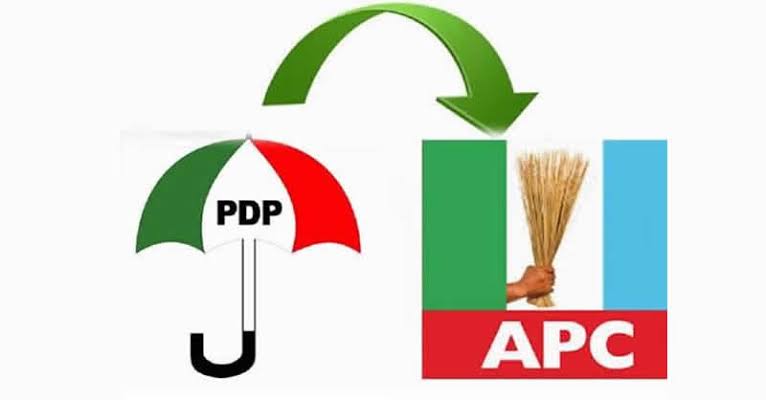
Three opposition members of the House of Representatives on Thursday formally announced their defection to the ruling All Progressives Congress (APC) during plenary.
The Reps include Oluwole Oke from Osun State, who left the Peoples Democratic Party (PDP), and Kabiru Hassan Rumrum and Sani Abdullahi, both from Kano State, who defected from the New Nigeria Peoples Party (NNPP) to the APC.
Rumrum had earlier declared his resignation from the NNPP and his return to the APC during a meeting with the party’s National Chairman, Dr. Abdullahi Umar Ganduje.
Also, Oke had earlier announced his departure from the PDP in Osun State and his decision to join the APC.
Their defections were formally announced by Speaker Abbas Tajudeen at Thursday’s plenary, increasing the total number of lawmakers who have switched parties since the inauguration of the 10th National Assembly to 30.
Of the 30 defectors, 27 have joined the APC from the PDP, Labour Party, African Democratic Congress (ADC), and the NNPP.
-

 News13 hours ago
News13 hours agoTinubu Endorses Establishment of Forest Guards to Counter Terrorism, Banditry
-

 Opinion6 hours ago
Opinion6 hours agoHuman Capital Devt: The Rep Paul Nnamchi
-

 News12 hours ago
News12 hours agoNNPCL failed to remit N500bn revenue in 2024 – World Bank
-

 News12 hours ago
News12 hours agoFG launches smart police station in Abuja
-

 Education23 hours ago
Education23 hours agoJust in: JAMB orders UTME resit for 387,000 candidates
-

 News6 hours ago
News6 hours agoNnamdi Kanu’s family wants court to ban NAN coverage of son’s trial or allow live streaming
-

 News2 hours ago
News2 hours agoBREAKING: PDP, NNPP Rep members abandon parties, lace boots with APC
-

 News6 hours ago
News6 hours agoSEE Current Black Market Dollar (USD) To Naira (NGN) Exchange Rate




